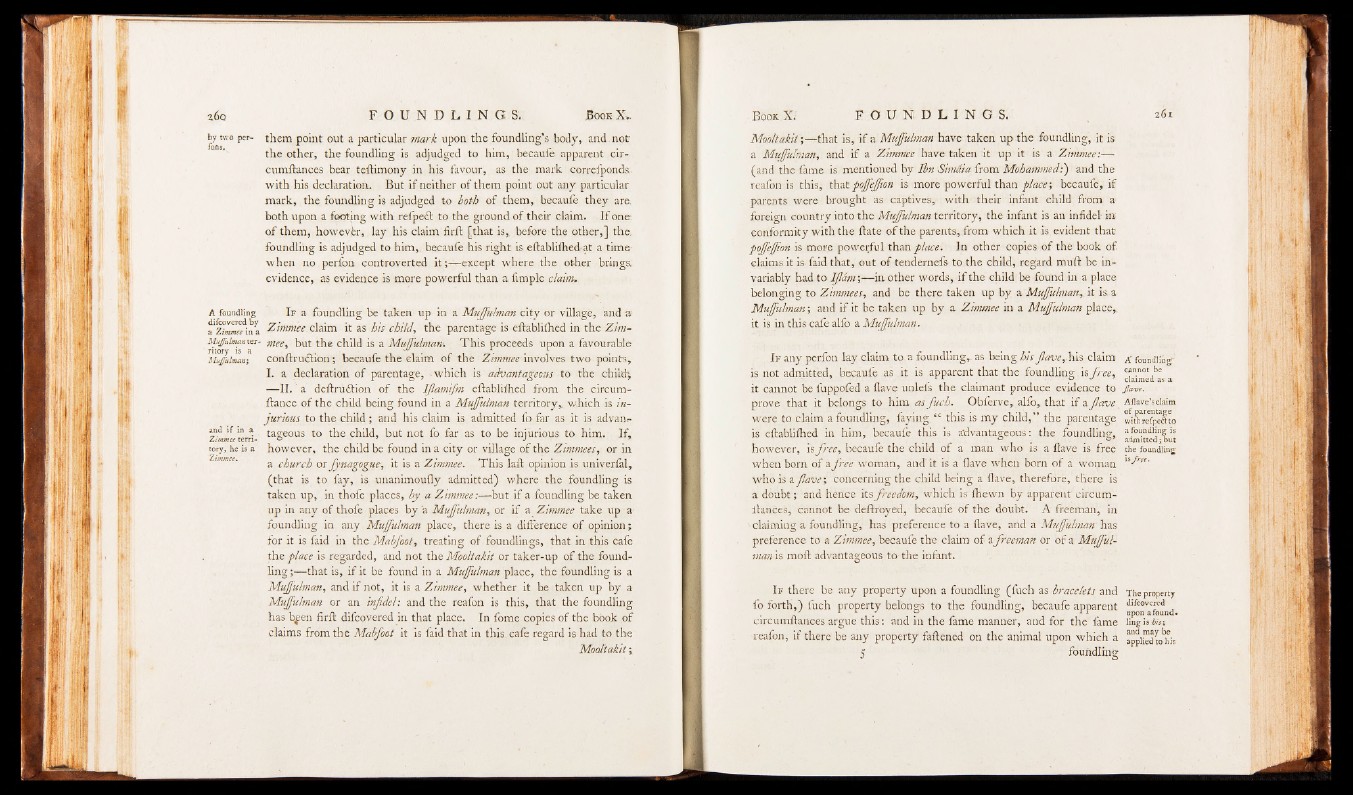
by two perrons.
A foundling
difcovered by
a Zimmee in a
Mujfulman territory
is a
Mujfulman i
and i f in a
Zimmee territory,
he is a
Zimmee»
them point out a particular mark upon the foundling’s body, and. not
the other, the foundling is adjudged to him, becaufe apparent cir-
cumftances bear teftimony in his favour, as the mark correfponds.,
with his declaration. But if neither of them point out any particular
mark, the foundling is adjudged to both of them, becaufe they are.
both upon a footing with refpedt to the ground of their claim. If one;
of them, howevfer, lay his claim firft [that is,, before the other,] the.
foundling is adjudged to him,, becaufe his right is eftablifhed-at a time
when no perfon controverted i t ;— except where the other brings,
evidence, as evidence is more powerful than a, limple claim.
If a foundling be taken up in a Mujfulman city or village, and a
Zimmee claim it as his child, the parentage is eftablilhed in the Zimmee,
but the child is a MujfulmanI This proceeds upon a favourable
conftruftion; becaufe the elaim of the Zimmee involves two points,
I. a declaration of parentage, which is advantageous to the chilth
— II. ’ a deftru&ion of the IJlamifm eftablilhed from the circum-
ftance of the child being found in a Mujfulman territory* which is injurious
to the child ; and his claim is admitted fo. far as it is advantageous
to the child, but not fo far as to be injurious to him. If,
however, the child be found in a city or village of the Zimmees, or in
a church or fynagogue, it is a Zimmee. This laft opinion is univerfal,
(that is to fay, is unanimoufly admitted} where the foundling is
taken up, in thofe places, hy a Zimmee:— but if a foundling be taken
up in any of thofe places by a Mujfulman, or if a Zimmee take up a
foundling in any Mujfulman place, there is a difference of opinion;
for it is faid in the Mahfoot, treating of foundlings, that in this cafe
the place is regarded, and not the Mooltakit or taker-up of the foundling
;— that is, if it be found in a Mujfulman place, the foundling is a
Mujjulman, and if not, it is a Zimmee, whether it he; taken up by a
Mujfulman or an infidel: and the reafon is this, that the foundling
has b^en firft difcovered in that place. In fome copies of the book of
claims from the Mahfoot it is faid that in this cafe regard is had to the
Mooltakit;
Mooltakit-,— that is, if a Mujfulman have taken up the foundling, it is
a Mujfulman, and if a Zimmee have taken it up it is a Zimmee:—
(and the fame is mentioned by Ibn Simdia from Mohammedl) and the
reafon is this, thatpojfejfion is more powerful than place-, becaufe,. if
parents were brought as . captives, with their infant child from a
foreign country into the Mujfulman territory, the infant is an infidel in;
conformity with the ftate of the parents, .from which it is evident that
pojfefjion is more powerful than place. In other copies; of the book of
claims it is- faid that, out of tendernefs to the child, regard muft be invariably
had to IJldm-,— in other words, if the child be found in a place
belonging to Zimmees, and be there taken up by a Mujfulman,. it i& a
Mujfulman; and if it be taken up by a. Zimmee in a Mujfulman place,
it is in this cafe alfo a Mujfulman.
If any perlbn lay claim to a foundling, as being his fa v i?,his claim
is not admitted, becaufe as it is apparent that the foundling is free,
it cannot be fuppofed a Have unlefs the claimant produce evidence to
prove that it belongs to him as fuch. Obferve, alfo, that if a fa v e
were to claim a foundling, faying.“ this is my child,” the parentage
is eftablilhed in him, becaufe this is advantageous: the foundling,
however, is free, becaufe the child of a man who is a flave is free
when born of a free woman, and it is a flave when born of a woman
who is a flave-, Concerning the child being'a flave, therefore, there is
a doubt; and hence its freedom, which is fhewn by apparent circum-
ftances, cannot be deftroyed, becaufe of the doubt. A freeman, in
claiming a foundling, has preference to a flave, and a Mujfulman has
preference to a Zimmee, becaufe the claim of a freeman or of a Mujful-
manis moft advantageous to the infant.
If there be any property upon a foundling (fuch as bracelets and
fo forth,) fuch property belongs to the foundling, becaufe apparent
circumftances argue this: and in the fame mannerj and for the fame
reafon, if there be any property fattened on the animal upon which a
5 foundling
A foundling'
cannot be
claimed as a
Jlave.
Aflave’sclaim
o f parentage
with refpedt to
a foundling is
admitted; but
the foundling
is free.
The property
difcovered
upon a found*
ling is hisi
and may be
applied to his